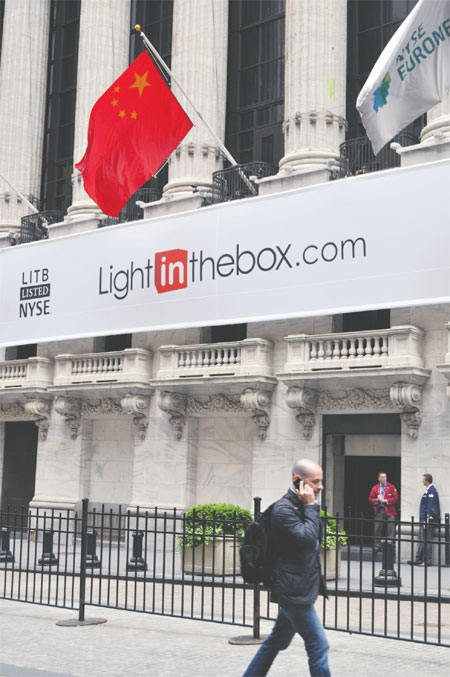LightInTheBox makes robust IPO
Updated: 2013-06-07 12:12
By Michael Barris in New York (China Daily)
|
||||||||
|
The Chinese national flag and the logo of the Chinese e-commerce website LightInTheBox are seen at the New York Stock Exchange on Thursday. Michael Barris / China Daily |
Ending a seven-month drought of initial public offerings in the United States for Chinese companies, online retailer LightInTheBox made a solid public market debut Thursday in its first trading on the New York Stock Exchange.
The Beijing-based company's American depositary receipts - which are being closely watched for signs that US investors are ready to buy stocks of Chinese companies again - jumped 22.1 percent to close at $11.61.
The shares, which trade under the symbol, LITB, priced at $9.50 apiece, in the middle of the company's IPO target range of $8.50 to $10.50, then rose as much as 33.6 percent above the offering price, to $12.69, before settling. The IPO raised $79 million and marked the company's initial market value at $465 million. LightInTheBox sells inexpensive Chinese-made goods like fishing rods and wedding dresses to customers mostly in other countries, often with free shipping.
"We had a great IPO and I'm very proud it, but I think as CEO it's more important how I run this company," said CEO Alan Guo in an interview. "So I assume the stock will take care of itself. "
Guo was given the honor of ringing the bell at 4 p.m. to mark the end of the day's trading session - joining other figures in IPOs, celebrities and other newsmakers who have taken part in the well-publicized tradition at the 196-year-old exchange.
Guo declined to speculate whether the success of LightInTheBox's IPO would jump-start a revival in US-listed Chinese IPOs. US stock market listings by Chinese companies have been hurt by negative sentiment tied to accounting scandals and fraud allegations involving US-listed Chinese companies.
"I can only speak for LightInTheBox," Guo said. "We are a unique company. Every company needs to go through their own process to get results."
Prior to the offering, Guo and his team spent two weeks travelling extensively to US and European financial centers to build interest in the offering and resolve any outstanding questions about the company's governance practices or accounting procedures. The successful opening-day of his company's offering was his reward for that hard work, the CEO acknowledged.
"I have been talking a lot to all the investors, to learn what they think," he said. "The more communication you do, the more upfront you are, the better the trust is going to be, and you will form a great partnership in the long run."
Jim Fink, an analyst for Investing Daily, an online investment advice website, told China Daily recently that he expected investors to warm to the offering, particularly because LightInTheBox generates 85 percent of its revenue in North America and Europe, where accounting procedures are more likely to satisfy US regulators.
The IPO was the first by a China-based company in the US since social-gaming operator YY Inc went public on Nasdaq in November.
The number of initial offerings by Chinese companies fell to three last year from 13 in 2011 and 38 in 2010, according to data compiled by Bloomberg.
A series of accounting scandals and fraud allegations involving US-listed Chinese companies led US regulators to reject IPO-related audits by Chinese affiliates of the Big Four accounting firms. But the China Securities Regulatory Commission said two weeks ago it would give the US Public Company Accounting Oversight Board access to documents from the Chinese auditors.
The announcement followed a lengthy effort by the PCAOB and the US Securities and Exchange Commission to improve financial disclosure by Chinese companies trading on US exchanges. Before the announcement, the SEC had said it would accept the audits only if it could review underlying documents, but Chinese regulators said they couldn't release such information because domestic law considers such information a state secret.
Besides depressing the market for US IPOs by Chinese companies, the dispute led to lower share prices for some Chinese firms already trading on US exchanges.
michaelbarris@chinadailyusa.com
(China Daily USA 06/07/2013 page5)

 Michelle lays roses at site along Berlin Wall
Michelle lays roses at site along Berlin Wall
 Historic space lecture in Tiangong-1 commences
Historic space lecture in Tiangong-1 commences
 'Sopranos' Star James Gandolfini dead at 51
'Sopranos' Star James Gandolfini dead at 51
 UN: Number of refugees hits 18-year high
UN: Number of refugees hits 18-year high
 Slide: Jet exercises from aircraft carrier
Slide: Jet exercises from aircraft carrier
 Talks establish fishery hotline
Talks establish fishery hotline
 Foreign buyers eye Chinese drones
Foreign buyers eye Chinese drones
 UN chief hails China's peacekeepers
UN chief hails China's peacekeepers
Most Viewed
Editor's Picks

|

|

|

|

|

|
Today's Top News
Shenzhou X astronaut gives lecture today
US told to reassess duties on Chinese paper
Chinese seek greater share of satellite market
Russia rejects Obama's nuke cut proposal
US immigration bill sees Senate breakthrough
Brazilian cities revoke fare hikes
Moody's warns on China's local govt debt
Air quality in major cities drops in May
US Weekly

|

|








